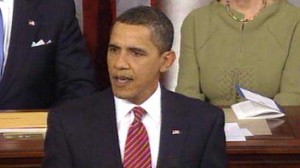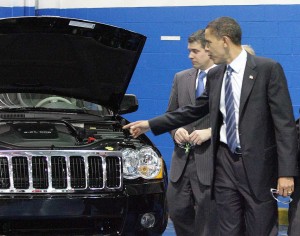
"The nation cannot walk away" from an auto industry "millions of jobs depend on."
“The nation that invented the automobile cannot walk away from it,” declared President Barack Obama, during a speech to the joint houses of Congress, Tuesday night.
The 52-minute address, effectively the new President’s first State of the Union, covered a broad range of topics, from the nation’s economic crisis, to the war in Iraq, from health care to education. But a fair share of the President’s comments were devoted to the ailing American auto industry and the energy policies that could shape the future of transportation.
Noting that “millions of jobs depend on it,” President Obama said that, “We are committed to the goal of a retooled, reimagined auto industry that can compete and win.” That was undoubtedly good news to Detroit’s troubled Big Three automakers. But other comments were also aimed at chastening the executives who oversaw the domestic industry’s desperate slide.
“As for our auto industry, everyone recognizes that years of bad decision-making and a global recession have pushed our automakers to the brink,” said the President. “We should not, and will not, protect them from their own bad practices.”

Candidate Obama at Chrysler's Jeep plant, in Detroit.
Half-empty or half-full? Big Three leaders might be forgiven if they come away from the speech to Congress desperately seeking to focus on the light, any light they can find, at the end of their long tunnel. In recent days, they’ve seen the belated creation of the Presidential Task Force on the Auto Industry, which will oversee the original bailout, approved by the Bush White House, last December. The Task Force will also judge the viability plans being crafted by General Motors and Chrysler – and recommend whether to accept the two makers’ bids for billions of dollars in additional aid.
The final decision will be made by the President himself, and the Tuesday night speech hinted at the direction he appears to be leaning, with Obama saying about the auto industry, “Millions of jobs depend on it. Scores of communities depend on it.” The U.S., he continued, “cannot walk away from it.”
But anyone who might hope to see the White House simply shore up the auto industry is in for a rude awakening. The nation’s future, the President’s speech also emphasized, on several occasions, will require a switch to cleaner, renewable fuels that leave the country less dependent on outside sources.
“We need to ultimately make clean, renewable energy the profitable kind of energy. So I ask this Congress to send me legislation that places a market-based cap on carbon pollution and drives the production of more renewable energy in America,” Pres. Obama declared, to much applause. “And to support that innovation, we will invest fifteen billion dollars a year to develop technologies like wind power and solar power; advanced biofuels, clean coal, and more fuel-efficient cars and trucks built right here in America.”
For the auto industry, that means there’ll be no stepping back from upcoming regulations requiring sharp increases in fuel economy. If anything, the President’s comments would suggest that he might favor even tougher rules, proposed by the State of California, officially regulating carbon dioxide emissions, but effectively boosting automotive fuel economy even more than current federal regulations demand.
A final decision on the automotive bailout won’t come until after the completed viability plans are submitted, on March 31st. While the industry might feel a little more hopeful, going forward, they also must recognize that the challenges they’ll face won’t end with the handover of additional federal loans.

Umm. Well, we do know that the United States was not the country that invented the automobile. Do da names Benz and Daimler ring a bell?
Thinking that American car buyers “walked away” from the U.S. auto industry puts the cart before the horse. It’s more the other way around – the U.S. auto industry walked away from American car buyers. For decades they produced poor quality vehicles using antiquated and unimaginative designs. The only attention they paid to safety, fuel economy, and environmental concerns was to lobby against laws regulating them and to tie the federal and state governments up in court fighting what puny laws were passed. They did their best to undermine workers with outsourcing manufacturing to third world countries and two tiered contracts with unions. They squeezed their suppliers to the point of bankruptcy. They squelched any earnest attempts at developing alternative fuel technologies, like the EV-1, that did accidently bubble up through their innovation stifling organizations. And they completely neglected cars while pumping out ever more and bigger SUVs and trucks like there was no tomorrow. Well, tomorrow is here and their management wants us to bail them out. Why? Are GM and Chrysler’s management really going to change their ways? Or are their promises to do so as sincere as the alcoholic family member who swears that, really, he is done drinking if you’ll just post his bail this one last time?